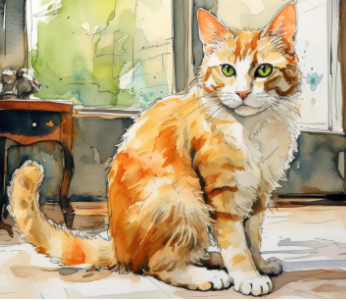Cat Diarrhea
Cat diarrhea is a common issue that many pet owners face at some point in their lives. While it may seem like a minor inconvenience, it can sometimes signal a more serious underlying health problem. This comprehensive guide will explore the causes, symptoms, treatment options, and preventive measures for cat diarrhea. Additionally, we’ll address frequently asked questions to help you navigate this challenging issue with confidence.
What is Cat Diarrhea?
Diarrhea in cats is characterized by frequent, watery, and loose bowel movements. It can be a one-time occurrence or a recurring problem. Diarrhea is not a disease in itself but a symptom of various underlying conditions. It’s essential to monitor your cat’s health closely when you notice diarrhea to determine its cause and seek appropriate treatment.
Causes of Cat Diarrhea
Cat diarrhea can be caused by a wide range of factors. Understanding these causes can help in diagnosing and treating the condition effectively.
1. Dietary Indiscretion
Cats are curious creatures and sometimes ingest things that don’t agree with their digestive systems. This could include spoiled food, new treats, or non-food items like plants or string. Ingesting such substances can disrupt their gastrointestinal (GI) tract and lead to diarrhea.
2. Food Sensitivities or Allergies
Some cats have sensitivities or allergies to specific ingredients in their food. Common allergens include dairy products, grains, and certain proteins. If a cat with a food allergy or sensitivity consumes its trigger ingredient, diarrhea may result.
3. Dietary Changes
Abrupt changes in diet can upset a cat’s digestive system. If you switch your cat’s food too quickly, it may experience diarrhea. Gradual transitions are recommended to allow the digestive system to adjust.
4. Parasites
Intestinal parasites, such as worms (e.g., roundworms, hookworms, tapeworms) or protozoa (e.g., Giardia), can cause diarrhea in cats. These parasites interfere with the normal digestion and absorption of nutrients, leading to gastrointestinal upset.
5. Bacterial Infections
Bacteria like Salmonella or E. coli can cause gastrointestinal infections in cats. These infections can lead to diarrhea, often accompanied by vomiting and abdominal pain.
6. Viral Infections
Viruses such as feline panleukopenia or feline coronavirus can cause diarrhea in cats. These viral infections are usually more severe and require prompt veterinary care.
7. Stress
Cats are sensitive to changes in their environment. Stressors such as moving to a new home, the introduction of new pets, or changes in the household routine can trigger gastrointestinal disturbances, including diarrhea.
8. Inflammatory Bowel Disease (IBD)
IBD is a chronic condition where the gastrointestinal tract becomes inflamed. This inflammation can lead to persistent diarrhea, along with symptoms like vomiting and weight loss.
9. Tumors or Cancer
Although less common, tumors or cancer in the gastrointestinal tract can cause diarrhea. This is usually accompanied by other signs such as weight loss, loss of appetite, and lethargy.
10. Medications
Certain medications, especially antibiotics, can disrupt the normal balance of gut bacteria and result in diarrhea. If your cat is on medication, consult your veterinarian if diarrhea occurs.
Symptoms of Cat Diarrhea
Recognizing the symptoms of cat diarrhea is crucial for timely intervention. Symptoms may vary depending on the underlying cause but generally include:
- Frequent, watery stools: The stool may be loose and frequent.
- Blood or mucus in the stool: This can indicate inflammation or infection.
- Vomiting: Often accompanies diarrhea if the cause is systemic.
- Loss of appetite: Cats with diarrhea may eat less or refuse food.
- Lethargy: Decreased energy or activity levels.
- Dehydration: Prolonged diarrhea can lead to dehydration. Signs include dry mouth, sunken eyes, and decreased skin elasticity.
Diagnosing Cat Diarrhea
Proper diagnosis is key to treating cat diarrhea effectively. If your cat shows signs of diarrhea, it’s important to consult your veterinarian. Your vet will perform a thorough examination and may recommend the following diagnostic tests:
- Fecal Exam: To check for parasites or bacterial infections.
- Blood Tests: To assess overall health and check for underlying conditions.
- Imaging: X-rays or ultrasound may be used to visualize the gastrointestinal tract.
- Endoscopy: In some cases, an endoscopy may be used to inspect the GI tract directly.
Treatment Options for Cat Diarrhea
Treatment for cat diarrhea depends on the underlying cause. Your veterinarian will tailor the treatment plan based on the specific diagnosis.
1. Dietary Management
For cases caused by dietary indiscretion or sensitivities, a change in diet may be necessary. Your vet may recommend a bland diet (such as boiled chicken and rice) or a hypoallergenic diet. Ensure that any dietary changes are made gradually to avoid further gastrointestinal upset.
2. Medications
- Antibiotics: If a bacterial infection is diagnosed, antibiotics may be prescribed.
- Anti-parasitic Medications: For intestinal parasites, appropriate dewormers or anti-parasitic treatments will be used.
- Anti-diarrheal Medications: Sometimes, medications to reduce diarrhea may be prescribed, but they should only be used under veterinary guidance.
3. Probiotics
Probiotics can help restore the natural balance of gut bacteria and improve digestive health. Your vet may recommend a probiotic supplement.
4. Fluid Therapy
In cases of severe diarrhea leading to dehydration, fluid therapy may be necessary. This can be administered orally or via intravenous fluids, depending on the severity.
5. Addressing Underlying Conditions
If diarrhea is due to an underlying condition such as IBD or cancer, specific treatments targeting those conditions will be required. This may involve long-term medication, dietary changes, or other therapies.
Preventive Measures
Preventing cat diarrhea involves a combination of good management practices and regular veterinary care.
1. Gradual Diet Changes
Whenever you need to switch your cat’s food, do so gradually over 7-10 days to allow its digestive system to adapt.
2. High-Quality Diet
Feed your cat a high-quality, balanced diet appropriate for its age, size, and health needs. Avoid feeding human food or treats that might upset its stomach.
3. Regular Veterinary Check-ups
Routine veterinary visits can help detect and address potential health issues before they become serious. Regular check-ups also allow for timely vaccinations and parasite control.
4. Environmental Management
Minimize stress by maintaining a stable environment. Introduce new pets or changes gradually and provide your cat with a safe, comfortable space.
5. Preventing Parasites
Use regular flea and tick preventatives as recommended by your veterinarian. Keep your cat’s environment clean to reduce the risk of parasitic infections.
FAQs About Cat Diarrhea
Q1: When should I be concerned about my cat’s diarrhea?
A1: You should be concerned if diarrhea persists for more than 24-48 hours, is accompanied by other symptoms such as vomiting, lethargy, or blood in the stool, or if your cat shows signs of dehydration. In these cases, consult your veterinarian promptly.
Q2: Can I treat my cat’s diarrhea at home?
A2: Mild cases of diarrhea may resolve with dietary management or temporary fasting (withhold food for 12-24 hours). However, if the diarrhea persists, worsens, or is accompanied by other symptoms, seek veterinary advice for proper diagnosis and treatment.
Q3: How can I prevent my cat from getting diarrhea?
A3: To prevent diarrhea, gradually introduce new foods, provide a high-quality diet, manage stress, and ensure regular veterinary care. Keep your cat’s environment clean and use preventative measures for parasites.
Q4: Are there any home remedies for cat diarrhea?
A4: While some home remedies, like a bland diet of boiled chicken and rice, may help, it’s essential to consult your veterinarian before using any home remedies. They can provide guidance based on your cat’s specific condition.
Q5: Can cat diarrhea be a sign of a serious illness?
A5: Yes, persistent or severe diarrhea can be a sign of more serious health issues such as inflammatory bowel disease, tumors, or viral infections. Early veterinary evaluation is crucial to identify and treat any underlying conditions.
Conclusion Cat Diarrhea
Cat diarrhea is a common but manageable issue. By understanding the potential causes, symptoms, and treatment options, you can take proactive steps to ensure your cat’s health and well-being. Always consult your veterinarian if you have concerns about your cat’s health. With the right approach and timely intervention, most cases of cat diarrhea can be effectively managed, allowing your feline friend to return to their happy, healthy self.
For further information or specific concerns, your veterinarian is the best resource for tailored advice and treatment options.






